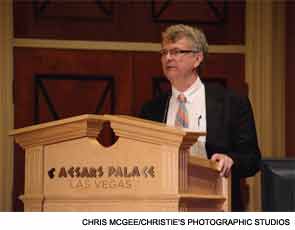
LAS VEGAS—Otolaryngologists from around the world gathered in Las Vegas for this year’s Combined Otolaryngology Spring Meetings (COSM), a conference of nine otolaryngological societies, held May 14-18.
Health professionals from surgeons to residents to students heard the latest research, dished opinions on recent issues in the field, and engaged in thought-provoking discussions on hot topics impacting otolaryngology.
Nearly 2,400 participants had registered by the afternoon of the third day of the conference, 1,700 of whom were physicians.
Attendees said they liked the variety of material offered at COSM and the relatively small size of the meeting. “The reason I wanted to come to this particular conference is because it covered so many different specialties,” said Christopher Selinsky, DO, a fourth-year resident at Doctors Hospital in Columbus, Ohio.
Natasha Mirza, MD, director of the Penn Center for Voice and Swallowing at the Hospital of the University of Pennsylvania in Philadelphia, said the setting allows for an easy exchange of ideas. “I think of all the meetings we have, I find COSM—because it’s a little smaller—to probably be the most educational,” she said.
Presidential Address
In his address, Jonas T. Johnson, MD, president of the Triological Society and professor and Dr. Eugene N. Myers Chair of otolaryngology at the University of Pittsburgh School of Medicine, said otolaryngologists have to take it upon themselves to shape the medical field’s response to healthcare reform. He called his talk “The Real Challenges of Healthcare Reform” and told the audience that “the real challenge, just between you and me, is us…. We still have work to do.”
Here are some of the major points he covered in his address:
- Healthcare spending. In the developed world, approximately $3,300 per capita is spent on healthcare per year. In the U.S., it’s $8,000. But in two important categories, longevity and infant mortality, the U.S. compares poorly with other industrialized countries. “It’s an embarrassment,” Dr. Johnson said.
- Evidence-based care. Part of the U.S. government’s plan is to gain money by eliminating waste and delivering evidence-based care. “Those of you and I who are on the ground floor understand that the evidence is not very good…. In order to be making progress in all of this, we need evidence.”
- Finger pointing. Physicians don’t tend to point to their own habits as wasteful, he said. A New England Journal of Medicine editorial published earlier this year pointed out how societies participating in the Choosing Wisely campaign, which is designed to spotlight potentially wasteful practices, tended to point to other specialties’ services as low value (N Engl J Med. 2014;370:589-592).
- Rethinking treatment. Otolaryngologists should perhaps rethink procedures. “Do you think maybe we’re overdoing it with sinus surgery and balloon-plasty and this and that? And where exactly is the evidence base in sleep surgery?” he asked. “And, oh, by the way, ladies and gentlemen, do we really have to take out every benign tumor? I mean, let’s think about it.”
- Overdiagnosis. Thyroid cancer cases were up 209% from 2001 to 2013, but mortality from the disease stayed unchanged. “This isn’t an epidemic of disease…. This is an epidemic of diagnosis.” He wondered whether people are being overdiagnosed and overtreated.
- Controlling costs. “Failing in our duty as financial stewards may result in worse outcomes for everybody,” he said, because costly interventions with little chance of providing benefit cause costs to spiral upward, potentially making this money unavailable for effective therapies.
How can physicians help? He said he didn’t want to suggest that he has the ultimate solution but added, “I believe in the wisdom of crowds, and there’s nobody who can better help us make decisions—important decisions—about healthcare and healthcare resources than you and I. We [the physicians] have to be involved. We have to be agents of change… The Affordable Care Act is a catalyst to get us to address these problems.”
Leave a Reply